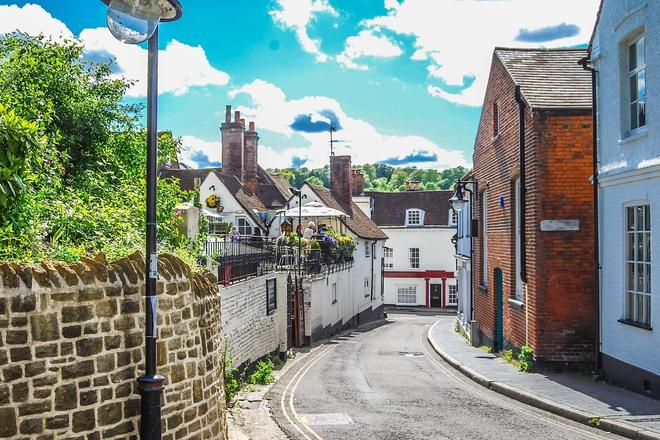A passion for the English language has always been the driving force for Daniela Baňacká, a 19-year-old student who has completed her secondary school education in Winchester, England, to explore opportunities beyond Slovakia’s borders.
“While I hold a deep affection for Slovakia, I longed to experience life elsewhere,” she tells The Slovak Spectator.
It is estimated that over 300,000 Slovaks, primarily young people, have left Slovakia in the past 15 years. Each had their own reasons: seeking better job opportunities, higher educational standards, improved quality of life, enhanced language skills, or simply a desire to explore new horizons.
Filip Fraňo, a 31-year-old cybersecurity expert, followed his family to Switzerland after his secondary school studies in Slovakia. He says that he wanted to experience life there firsthand. Similarly, Matej Adam Balint, a 19-year-old studying at a college in Portugal, always envisioned leaving Slovakia one day.
“It was the most natural option for me,” he says.
While these three Slovaks left their homeland to explore the world, they do not provide a single answer as to whether they would want to return to live in Slovakia.
More opportunities and helpful officers
In England, Baňacká discovered a stark contrast to Slovakia in terms of the abundance of opportunities, particularly when it came to her passion for acting and the arts, an area that is not always well-served by Slovak schools. Her journey at her English school opened doors to singing, guitar playing, and self-discovery.
“There’s no such thing as ‘you can’t sing’: you just have to learn it,” she remarks, highlighting her experience joining a school band and landing the lead role in a school musical.
Fraňo and Balint highlight that people who work in banks and offices in Switzerland and Portugal are exceptionally pleasant, at least based on their encounters.
“In Portugal, my interactions with office workers have been overwhelmingly positive, a sharp contrast to the anxiety I used to feel back in Slovakia about inconveniencing workers,” Balint contrasts. He also notes that Portuguese people are generally more helpful and kind to strangers than Slovaks. Even his grandmother, who visited recently, was struck by the friendly attitude towards strangers. “I don’t think we necessarily try to be as kind to each other, as strangers.”
Baňacká shares Balint’s perspective, observing that people in England are “super-eager to help”, a trait she does not always find in Slovakia.
“Slovaks are reserved when you first meet them,” she remarks. However, she values Slovak people’s straightforwardness, noting that her Slovak friends tend to express their feelings openly. “In England, I have noticed that many of my friends keep their emotions to themselves and only bring them up later.”
Slovakia lacks diversity
Thanks to her time in England and exposure to various cultures in her classes, Baňacká has grown more open-minded. She notes that Slovakia is becoming more diverse, but in her view, it is still “incomparable” to England.
The number of foreigners with permanent residence in Slovakia, a country of 5.4 million, has doubled in the past decade, rising to almost 60,000. However, many foreigners come from the neighbouring countries, or from southeastern Europe.
Balint realised the extent of Slovakia’s lack of diversity while riding an underground train in Portugal. “I looked around and thought, ‘I’m in the minority here as a white person,’” he recalls. He believes that Slovakia struggles to embrace and accept differences, often imposing rigid standards.
“I cherish diverse environments. They encourage personal growth,” adds Balint, who identifies as gay.
Coming home, or rather not
Balint, concerned about safety, hesitates about returning to Slovakia. In 2022, two queer people were murdered in Bratislava. Politicians from all sides of the political spectrum have been attacking and exploiting the queer community for their own political gain, denying them the rights enjoyed by queer communities in other Western countries.
A June 2024 survey shows that only 37 percent of people think that LGBT+ people should enjoy the same rights as heterosexual people.
“I don’t feel as welcome or as safe in Slovak society compared to other places,” he reflects, expressing little hope of imminent change. Despite this, as a young person, he remains eager to explore other cultures, further fuelling his desire to live outside Slovakia.
Meanwhile, Fraňo, who is on the verge of completing his diploma in November, stands at a career crossroads. With aspirations to secure a new job, he remains open to staying in Switzerland or exploring other opportunities abroad. Reflecting on his experiences, he finds that adjusting to life abroad has often differed from his expectations. Slovakia – his home – might not be the place he would choose to relocate, although he holds positive feelings towards the country.
“I still consider Slovakia a good country to live in,” he says.
Baňacká, contemplating her future, expresses openness to returning to Slovakia. While she plans to pursue higher education abroad, her attachment to Slovakia grows stronger over time.
“As time has passed, I’ve started to miss Slovakia in small ways,” she reflects. “In the long run, I intend to return, at least for a while, as I truly feel it’s my home.”


 A street in Winchester, England. (source: Pixabay)
A street in Winchester, England. (source: Pixabay)